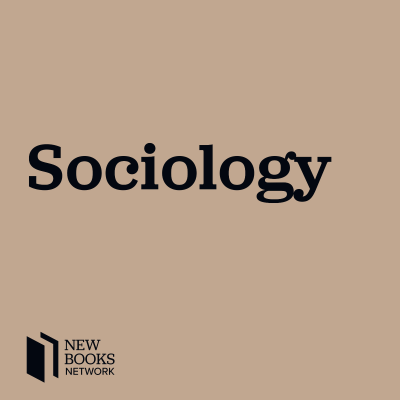
New Books in Sociology
Podcast af New Books Network
Interviews with Sociologists about their New Books Support our show by becoming a premium member! https://newbooksnetwork.supportingcast.fm/sociology
Prøv gratis i 7 dage
99,00 kr. / måned efter prøveperiode.Ingen binding.
Alle episoder
3478 episoder"Unveiling Entrepreneurial Identities: Perspectives from Women Entrepreneurs in the Global South" by Manesha Peiris explores the lived experiences of 44 women entrepreneurs in Sri Lanka (https://doi.org/10.1344/jesb.43208 [https://doi.org/10.1344/jesb.43208]). The study examines their views on entrepreneurship and their strategies for belonging to business communities through an intersectional lens that considers gender, race-ethnicity, social class, and lifecycle stage. This article is part of a Special Issue on women as economic actors in the Journal of Evolutionary Studies in Business, edited by Beatriz Rodríguez-Satizabal, Laura Milanes-Reyes, and Paula de la Cruz-Fernández (Vol. 10 No. 1, 2025). The issue is available at https://revistes.ub.edu/index.php/JESB/issue/view/3089 [https://revistes.ub.edu/index.php/JESB/issue/view/3089]. Pathiranage Padmali Manesha Peiris is a Senior Lecturer in Reflective Practice and Project Management at Queen Mary University of London. Her research interests focus on gender and entrepreneurship. Her work in this area explores women’s entrepreneurial identities, structural barriers in the Global South, and feminist perspectives on business practices. Hosted by Laura Milanés-Reyes Learn more about your ad choices. Visit megaphone.fm/adchoices [https://megaphone.fm/adchoices] Support our show by becoming a premium member! https://newbooksnetwork.supportingcast.fm/sociology [https://newbooksnetwork.supportingcast.fm/sociology]
Central bank cooperation during global financial crises has been anything but consistent. While some crises are arrested with extensive cooperation, others are left to spiral. Going beyond explanations based on state power, interests, or resources, in Bankers' Trust: How Social Relations Avert Global Financial Collapse (Cornell University Press, 2025) Dr. Aditi Sahasrabuddhe argues that central bank cooperation—or the lack thereof—often boils down to ties of trust, familiarity, and goodwill between bank leaders. These personal relations influence the likelihood of access to ad hoc, bilateral arrangements with more favorable terms. Drawing on archival evidence and elite interviews, Sahasrabuddhe uncovers just how critical interpersonal trust between central bankers has been in managing global financial crises. She tracks the emergence of such relationships in the interwar 1920s, how they helped prop up the Bretton Woods system in the 1960s, and how they prevented the 2008 global financial crisis from turning into another Great Depression. When traditional signals of credibility fell short during these periods of crisis and uncertainty, established ties of trust between central bank leaders mediated risk calculations, alleviated concerns, and helped innovate less costly solutions. Dr. Sahasrabuddhe challenges the idea that central banking is purely apolitical and technocratic. She pinpoints the unique transnational power central bank leaders hold as unelected figures who nonetheless play key roles in managing states' economies. By calling attention to the influence personal relationships can have on whether countries sink or swim during crises, Bankers' Trust asks us to reconsider the transparency and democratic accountability of global financial governance today. This interview was conducted by Dr. Miranda Melcher whose book [https://www.bloomsbury.com/uk/securing-peace-in-angola-and-mozambique-9781350407930/] focuses on post-conflict military integration, understanding treaty negotiation and implementation in civil war contexts, with qualitative analysis of the Angolan and Mozambican civil wars. You can find Miranda’s interviews on New Books with Miranda Melcher [https://newbooksnetwork.com/category/special-series/new-books-with-miranda-melcher], wherever you get your podcasts. Learn more about your ad choices. Visit megaphone.fm/adchoices [https://megaphone.fm/adchoices] Support our show by becoming a premium member! https://newbooksnetwork.supportingcast.fm/sociology [https://newbooksnetwork.supportingcast.fm/sociology]
Over the past 50 years, lesbian, gay, bisexual, transgender, and queer professionals have organized to achieve greater inclusion into the fields of science, technology, engineering, and mathematics (STEM). This inclusion, however, has come at a cost. In the 1970s, these professionals sought to radically transform STEM fields by confronting the homophobia and sexism embedded within them. Instead, these fields became more corporatized and privatized, and STEM institutions and workspaces—particularly in the spheres of government and business—became dominated by a focus on individualism, self-improvement/advancement, and meritocracy, which are hallmarks of neoliberalism. For many LGBTQ STEM professionals, inclusion now required becoming more apolitical, pro-capital, and focused on professional development. In Out Doing Science: LGBTQ STEM Professionals and Inclusion in Neoliberal Times (University of Massachusetts Press, 2025), Dr. Tom Waidzunas, Dr. Ethan Czuy Levine, and Dr. Brandon Fairchild explore this transformation of LGBTQ STEM professionals from oppositional outsiders to assimilationist insiders. Drawing on historical archives, oral interviews, and participant observation of professional societies and workspaces, the authors interrogate the meanings of “inclusion” and why some LGBTQ STEM professionals have benefited from it more than others. They also advocate for a “queer STEM” that challenges and transforms the racism, classism, sexism, cisheterosexism, and imperialism of these fields, institutions, and workspaces. Written in an accessible and engaging style, Out Doing Science will appeal to readers interested in LGBTQ studies, and science and technology studies, as well as anyone who wants to create a more diverse and inclusive work environment. This interview was conducted by Dr. Miranda Melcher whose book [https://www.bloomsbury.com/uk/securing-peace-in-angola-and-mozambique-9781350407930/] focuses on post-conflict military integration, understanding treaty negotiation and implementation in civil war contexts, with qualitative analysis of the Angolan and Mozambican civil wars. You can find Miranda’s interviews on New Books with Miranda Melcher [https://newbooksnetwork.com/category/special-series/new-books-with-miranda-melcher], wherever you get your podcasts. Learn more about your ad choices. Visit megaphone.fm/adchoices [https://megaphone.fm/adchoices] Support our show by becoming a premium member! https://newbooksnetwork.supportingcast.fm/sociology [https://newbooksnetwork.supportingcast.fm/sociology]
Through deep attention to sense and feeling, Go with God grapples with the centrality of Evangelical faith in Rio de Janeiro's subúrbios, the city's expansive and sprawling peripheral communities. Based on sensory ethnographic fieldwork and attuned to religious desire and manipulation, this book shows how Evangelical belief has changed the way people understand their lives in relation to Brazil's history of violent racial differentiation and inequality. From expressions of otherworldly hope to political exhaustion, Go with God depicts Evangelical life as it is lived and explores where people turn to find grace, possibility, and a future. Mentioned in this episode: * Denyer Willis, Laurie. 2018. “‘It smells like a thousand angels marching’: The Salvific Sensorium in Rio de Janeiro’s Western Subúrbios.” Cultural Anthropology 33, no. 2: 324–348. Laurie Denyer Willis [https://www.lauriedenyerwillis.net/] is Senior Lecturer in Social Anthropology at the University of Edinburgh. Liliana Gil [http://lilianagil.info/] is Assistant Professor of Comparative Studies (STS) at The Ohio State University. Learn more about your ad choices. Visit megaphone.fm/adchoices [https://megaphone.fm/adchoices] Support our show by becoming a premium member! https://newbooksnetwork.supportingcast.fm/sociology [https://newbooksnetwork.supportingcast.fm/sociology]
How did the addition of lifeboats after the Titanic shipwreck contribute to another tragedy in Chicago harbor three years later? How efficient are wild animals as investors, and how do dog breeds become national symbols? Why have scientific breakthroughs so often originated in the study of shadows? How did the file card prepare scholarship and commerce for the rise of electronic data processing, and why did the visual metaphor of the tab survive into today's graphic interfaces? Why have Amish artisans played an important role in manufacturing advanced technology? Why was United Shoe Machinery the Microsoft of the 1890s? Surprises like these, Edward Tenner believes, can help us deal with the technological issues that confront us now. Since the 1980s, Edward Tenner has contributed essays on technology, design, and culture to leading magazines, newspapers, and professional journals, and has been interviewed on subjects ranging from medical ethics to typography. Why the Hindenburg Had a Smoking Lounge: Essays in Unintended Consequences [https://bookshop.org/a/12343/9781606180273] (American Philosophical Society Press, 2025)--named for one of the paradoxes that can result from the inherent contradictions between consumer safety and product marketing--brings many of Tenner's essays together into one volume for the first time, accompanied by new introductions by the author on the theme of each work. As an independent historian and public speaker, Tenner has spent his career deploying concepts from economics, engineering, psychology, science, and sociology, to explore both the negative and positive surprises of human ingenuity. Edward Tenner is an independent writer and Distinguished Scholar in the Smithsonian's Lemelson Center for the Study of Invention and Innovation. He was a visiting scholar at the Institute for Advanced Study at Princeton and teaches the course Understanding Disasters at Princeton University. Caleb Zakarin is editor of the New Books Network. Learn more about your ad choices. Visit megaphone.fm/adchoices [https://megaphone.fm/adchoices] Support our show by becoming a premium member! https://newbooksnetwork.supportingcast.fm/sociology [https://newbooksnetwork.supportingcast.fm/sociology]
Prøv gratis i 7 dage
99,00 kr. / måned efter prøveperiode.Ingen binding.
Eksklusive podcasts
Uden reklamer
Gratis podcasts
Lydbøger
20 timer / måned

































